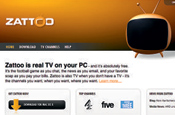Their reaction is understandable - the site, based in Switzerland, has attracted more than 2m registered users in Europe and has ambitious plans for the UK, where it hopes to have 450,000 registered users by the end of the year. The service has the potential to land a serious hit on UK broadcasters' audiences.
Zattoo, which uses an easily downloadable programme to offer simulcast TV on a PC, maintains that it currently conforms to the rules set out in the UK Copyright Act, which allow it to stream live TV content from the BBC, Channel 4 and Five. It is unable to take an ITV feed because its programmes are transmitted regionally. It also carries feeds from broadcasters on the Continent.
However, as Marketing reported last week, some UK broadcasters have been consulting lawyers, questioning the legality of Zattoo's use of their feeds. In particular, they are concerned that the rebroadcasting will cause them to lose out financially.
What clouds the matter further is the clear disparity between the website and broadcasters' claims of what has or has not been agreed between them regarding the feeds.
For its part, Zattoo states that it has 'reviewed the legal situation and entered into carriage agreements with broadcasters since the beginning of 2007'. On the other hand, Five claims that 'the inclusion of the Five service on Zattoo has not been authorised or licensed by Five', while Channel 4 has issued a similar statement, saying that it is 'concerned about any new platforms, online or otherwise, that use C4 content without any agreements in place'.
What is clear, however, is that Zattoo represents a wider challenge to the primacy of broadcasters in the transmission of their content, and that other independent players, swayed by the growing trend of viewing TV programming via the PC, will try to enter the market and cannibalise their audience.
Possibly the biggest challenge posed by the simulcast services is the lack of formal audience measurement by a third party such as BARB, which will make it almost impossible for content owners to make money from advertisers through this platform.
Zattoo defends its position, arguing that it offers TV advertisers an extended reach because it shows programmes in their entirety and does not cut out any ads to replace them with its own, but this is cold comfort to the broadcasters.
Where Zattoo makes its cash is in the ads it shows as users flick between broadcasters on the site. One of its key attractions is that it aggregates channels, so users are not forced to switch between dedicated websites as they would have to when watching rival broadcasters' streams. Advertisers that have signed up in other European countries include Coca-Cola, Heineken, Fujifilm, Nokia and Volvo - more are likely to follow in the UK if the service takes off here, too.
Alexandra Illes, the UK manager of Zattoo, says that advertisers are likely to be interested in accessing its young, technology-savvy audience - 80% of its users are 18-44. 'We will be looking to target advertisers here as we increase our numbers and to add further channels,' Illes says. 'We offer broadcasters a lot of benefits and are confident we can have a strong place in the market. When we launched in Spain we had 100,000 registered users in a week, so as we grow we hope to interest other broadcasters in what we can offer.'
Away from the obvious commercial impact, Nigel Walley, managing director of digital consultancy Decipher, believes that a proliferation of such sites could lead to uncertainty among viewers as to the quality or source of the content, and in the process, dilute broadcasters' hard-won brand proposition. 'Confusing viewers isn't what broadcasters will want to happen and this could be the case as more sites come on-stream,' he says.
The battles ahead will revolve around the competition for viewers. As yet, the broadcasters do not appear to be ready, or willing, to let simulcasters take their content without a fight. However, if aggregator sites prove as popular as iPlayer has for the BBC, they may have no choice but to change their position.
Broadcasters' response to Zattoo
BBC: 'We have not entered into any formal arrangements with Zattoo to redistribute BBC channels. However, we are reviewing our linear syndication policy following a number of trials around internet re--distribution of linear TV broadcasts.'
ITV: 'All content should stay on our site - that's our strategy. We wouldn't rule out third-party deals, but there aren't any in place at the moment.'
Channel 4: 'We are obviously concerned about any new platforms, online or otherwise, that use Channel 4 content without any agreements in place. We don't have any formal arrangements with Zattoo.'
Five: 'The inclusion of the Five service on Zattoo has not been authorised or licensed by Five and we are currently looking into the situation.'


